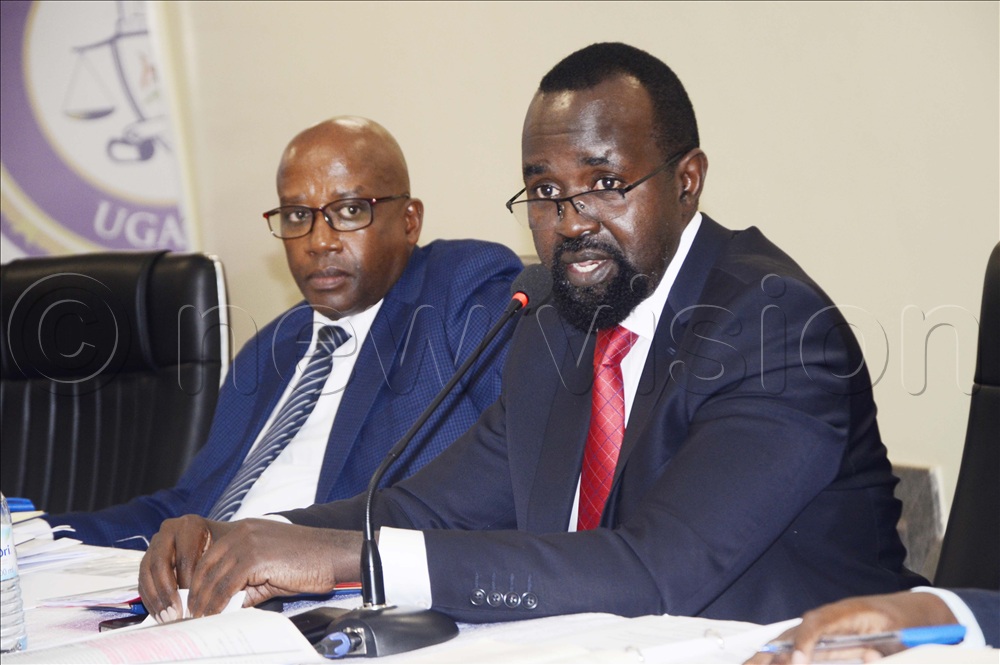Ground yourselves in electoral laws, judge tells magistrates
To manage pressure, Odoki said, there is a need for magistrates to have a broad understanding of electoral laws before handling sensitive cases.
A cross section of magistrates during the training on electoral disputes management at the Court of Appeal in Kampala on 11th November 2025. (Photos by Juliet Kasirye)
________________
To effectively handle post-election disputes that may arise after the 2026 General Election, High Court Judge Phillip Odoki has advised magistrates to exercise extra caution when handling electoral disputes.
While sharing his experience handling high-profile cases, such as Singh Katongole Vs Kasibante and Bright Rwamirama vs Dr Posiano Mugyenyi, Odoki said, the stakes were not only high, but the pressure was unusual.
“Incidentally, these cases were almost within two weeks. Imagine somebody has sold off all his property because he wants to win the elections, and you are here sitting as a chief magistrate determining whether he should lose it,” Odoki said.
“You receive calls from your loved ones because they have been contacted. You receive calls from your peers, and the bad news is that you are going to receive calls from your bosses. If you are unlucky, they will be telling you what to do,” Odoki said.
To manage pressure, Odoki said, there is a need for magistrates to have a broad understanding of electoral laws before handling sensitive cases.
He made the remarks during the training for chief magistrates on electoral disputes management organised by the Judicial Training Institute at the Court of Appeal in Kampala on November 11, 2025.

The two-day training focuses on equipping every judicial officer, from magistrates handling local council election petitions to justices of the appellate courts, with the knowledge and skills to deliver justice confidently and consistently.
In addition, the training is expected to also equip magistrates with legal and practical tools to manage recounts and petitions efficiently, ensuring procedural fairness, and rendering reasoned decisions within prescribed timelines.
Election disputes challenges
The challenge with parties, according to Odoki, is that an election usually has several candidates. For instance, if person A has 1,000 votes, person B has 997, and person C has 950 votes, a recount could actually make the third person become the winner.
During the training, Justice Geoffrey Kiryabirwe advised magistrates to use extreme measures if they have a difficult person.
For example, he said, the Nsereko case was interesting because his own law firm claimed they no longer represented him and asked the court to serve him personally. Since Nsereko’s phones were off, when officials went to his home and reached the gate, the policeman told them that if they entered the gate, the rest was up to them.
This, according to Kiryabirwe, was clearly an invasive attempt on service because if your own law firm denies you, then you know that you are playing a game.
Safeguard the will of the people
Deputy Chief Justice Dr Flavian Zeija said in just two months, Ugandans will return to the polls to elect leaders for various political positions. As judicial officers, it is your role to safeguard the will of the people by resolving post-election disputes fairly, promptly, and in strict conformity with the law.
The credibility of any election, according to Zeija, depends not only on how votes are cast but also on how disputes arising from that process are resolved. When courts handle post-election disputes transparently, they reinforce the legitimacy of electoral outcomes, deter unlawful electoral conduct, and provide peaceful means for resolving grievances instead of reverting to violence.
“As chief magistrates, you are often the first port of call for many election petitions, particularly at the local government level, but also where an application for a vote recount is made. In the last electoral cycle, a total of 52 election disputes from the chief magistrates’ courts proceeded on appeal to the High Court,” Zeija said.
“This figure, while reflecting the vibrancy of our electoral process and the confidence in the courts, highlights that errors are sometimes committed in the course of resolving these disputes. We cannot afford a repeat. Expediency without accuracy is chaos; accuracy without expediency is denial of justice,” Zeija advised magistrates.
To effectively manage electoral disputes, Zeija asked magistrates to address challenges including public perception and trust, tight constitutional and statutory times, intimidation and actual or perceived external influence, complexity of evidence and technology and inconsistent jurisprudence and procedural gaps.
“Intimidation or perceived external influence is most likely to happen. The parties tend to try to reach out to the judicial officers. They will come to you directly or through agents, or lie that you have been approached, all in an attempt to influence your decision, which threatens judicial independence,” Zeija added.
Each of these challenges, according to the deputy Chief Justice, if left unaddressed, risks undermining public confidence in the judiciary and, by extension, the legitimacy of the electoral process.
Zeija’s remarks were contained in a speech read on his behalf by Justice Geoffrey Kiryabirwe.
Judicial Training Institute (JTI) executive director Justice Prof. Andrew Khaukha said, JTI is committed to reskilling every judicial officer and facilitating easy and quick access to research materials that will, in turn, enable them to deliver well-reasoned decisions.
“Since the choice of facilitators selected to provide the training was deliberate, I call upon everyone to fully utilise their knowledge and wealth of experience to enrich your understanding of electoral jurisprudence and its practical application,” concluded Khaukha.